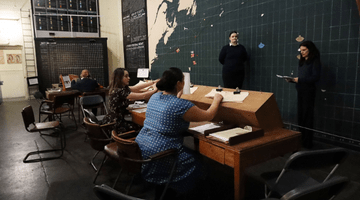Course modules
What you will study on this degree
Further guidance on modules
Modules are designated core or optional in accordance with professional body requirements, as applicable, and LJMU’s Academic Framework Regulations. Whilst you are required to study core modules, optional modules provide you with an element of choice. Their availability may vary and will be subject to meeting minimum student numbers.
Where changes to modules are necessary these will be communicated as appropriate.
Core modules
The Actor's Foundation: Musical Theatre Fundamentals I
30 credits
30 credits
This module presents you with fundamental acting, singing and dance approaches to realise musical theatre works. You work with ensemble and solo song techniques as well as group dance classes, building your confidence and ability to master auditioning. By the end of this module, you will have a practical portfolio of industry standard audition material and will be armed with the technical approaches to execute the rigours of auditioning in a variety of contexts.
The Actor's Foundation: Musical Theatre Fundamentals II
30 credits
30 credits
In this module, you begin to integrate acting, singing and dance skills. You will undertake project work that allows you to understand the combination of these three vital disciplines from a range of historical, cultural and international origins, uncovering contemporary interpretations. You will begin to understand your primary instrument and how to use it to your advantage. This expands your understanding and knowledge of musical theatre and musicianship, including performance possibilities.
The Actor's Foundation: Musical Theatre Fundamentals III
30 credits
30 credits
For this module you will conclude your foundation training by working with a professional director to integrate acting skills in a staged live performance project, combining your acting fundamentals. You work with professional etiquette and discipline in the rehearsal room, and become conversant with expected practice and vocabularies, and will present your live theatre work to an invited audience.
Personal Practice
30 credits
30 credits
This module provides you with the knowledge, communication and presentation skills to articulate your own ideas, opinions and feelings about current performance and industry practice in a staged performance project. These are crucial interpersonal and interview skills. It is carefully scheduled to accompany and complement an audition process, helping you to strategize your preparation and development for the next stage in your actor training. It provides you with the vital skills to fulfil personal statements and programme applications for advanced actor training in specialist institutions.
Fees and funding
Entry requirements
Please choose your qualifications below to view requirements
Grades/points required from qualifications:
Work out how many UCAS points your qualifications are worth using the UCAS Tariff Calculator.
Qualification requirements
A levels
We are committed to accepting students on to this course who have the potential to succeed as performers and who will gain sustained work in the performing arts and entertainment industries. With this in mind we wish to identify through applications and interview or audition key attributes and achievements. The key attributes that we seek to identify are: • Knowledge, ability and experience of acting • Commitment to the performing arts • Ability to work effectively with others • Broad interest and engagement • Self-awareness • Spirit of enterprise The minimum educational standard that we are looking for is: GCSEs We normally require a minimum of five GCSEs grade C. These should include Maths and English. Plus a minimum of 64 UCAS tariff points. We accept all types of equivalent qualifications, the following are the most common UK qualifications that people tend to apply to us with: A/AS Level This should be from two A Levels (i.e. grades C, C), excluding General Studies. Points from AS and Key Skills are not counted.
BTECs
Extended Diploma (i.e. Merit, Pass, Pass profile). BTEC Diploma (i.e. Merit, Merit). Acceptable on its own and combined with other qualifications such as an A Level, in which case total needs to be 64 UCAS tariff points across both qualifications. 90 Credit Diploma (Distinction, Merit). Acceptable on its own or can be combined with other qualifications such as an A Level, in which case total needs to be 64 UCAS tariff points.
International Baccalaureate
International Baccalaureate Acceptable on its own and with other qualifications Welsh Baccalaureate Acceptable on its own but is ideally combined with other qualifications as it is equivalent to one A Level.
Alternative qualifications considered
Audition or Interview Candidates are invited to audition/interview on the basis of completing the LIPA and/or UCAS application form. We look for evidence of the key attributes and an ability to achieve the qualifications standard. In exceptional cases people may be invited to audition/interview who have not met or are not on course to meet the qualifications standard. In these cases there must be substantial potential demonstrated against the other attributes. The audition or interview allows us to evaluate you as a practitioner in your area of interest. Offers of a place will follow where you demonstrate high ability and the potential to succeed. At the audition we provide an overview of LIPA and candidates are asked to present prepared pieces, they also take part in a practical workshop. At a recall event, candidates are asked to bring a piece of written work, take part in workshops and present prepared pieces. They may also be asked interview questions. On occasions, we may combine all elements in to a single audition. Equal Opportunity LIPA is an equal opportunities organisation and aims to successfully recruit students from a wide range of different socio-economic and personal backgrounds. To ensure we provide effective equality of opportunity within the application process we carefully consider each application individually and acknowledge differences that can exist between applicants’ experiences from diverse backgrounds. We regularly update our approaches to take into account changing understanding of communities and cultures and we monitor applicant/student characteristics such as age, gender and ethnicity. Recognition of Prior (Experiential) Learning [RP(E)L] and Credit Transfers If you can demonstrate that you have already achieved learning equivalent to a module or modules, or a level of study, in the programme then you may be eligible to be awarded credit for this learning or to have credit transferred from another UK institution. You will be required to complete an application to have your qualifications or experience approved by the Head of Discipline and the university. This requires the presentation of appropriate evidence and we will map the evidence against the programme outcomes to be certain of equivalence. If approved credit will be awarded and you will proceed on to the appropriate level of the course to complete the remaining credit for the award.
International requirements
Other international requirements
We welcome applications from students with qualifications from outside of the UK. Each application is considered on an individual basis and mapped to the appropriate entry level. We value the diversity of experience that students from different backgrounds bring to the course. IELTS Score of 6 is required
How to apply
Securing your place at LJMU
Your university life
From accommodation and academic support to clubs and societies. Find out what LJMU has to offer.
Talk to our students
Connect with a current LJMU student for advice and guidance on university life, courses and more.
See what our students are saying
At LJMU we want you to know you're making the right choice by studying with us. You can see what our students are saying about their experience with us through their reviews on the following websites:
Related Links
News and views
Browse through the latest news and stories from the university


.png)







The university reserves the right to withdraw or make alterations to a course and facilities if necessary; this may be because such changes are deemed to be beneficial to students, are minor in nature and unlikely to impact negatively upon students or become necessary due to circumstances beyond the control of the university. Where this does happen, the university operates a policy of consultation, advice and support to all enrolled students affected by the proposed change to their course or module.
Further information on the terms and conditions of any offer made, our admissions policy and the complaints and appeals process.









